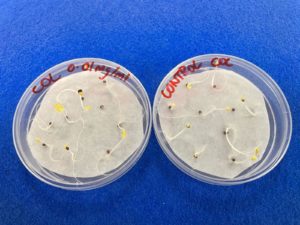The pilot plant of the LIFE Superbiodiesel project, after separating the fat fraction to obtain biodiesel, applies an enzymatic process to obtain biostimulants or organic fertilizers from the protein fraction obtained as a by-product of the previous process.
The use of these biostimulants simplifies the nitrogen cycle of plants by eliminating the nitrification stages. As a result, plants are feed directly with amino acids to form proteins, thus avoiding having to synthesize them and reserving this energy to carry out various metabolic processes that involve an increase in their production.
However, are the biostimulants obtained in the LIFE Superbiodiesel project comparable to commercial fertilizers?
The validation carried out has shown that these fertilizers meet the applicable standards on soil improvers by determining their good performance boosting plant growth. In addition, these tests shows them as suitable biostimulants giving them great potential for their commercialization.
Futhermore, the validation of the growth by germination of different varieties of plants revealed that, for example, in the case of Chinese cabbage, its growth rate increased by values between 35 and 40%, combined with low doses of biostimulants, improving stimulation compared to other commercial fertilizers of a similar nature.








Comments are closed.